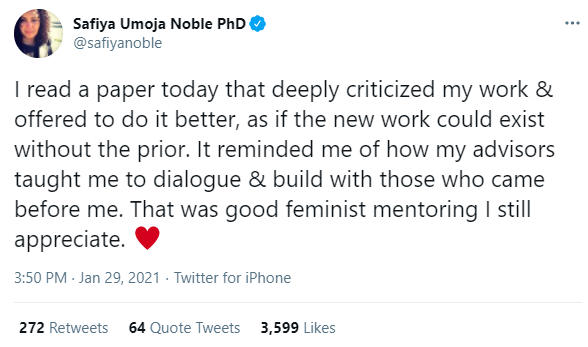Practical Interventions
As testified by the extensive work of Sara Ahmed (2017), Kimberlé Crenshaw (1989), Paulo Freire (2018), bell hooks (1994), and others, there are existing pedagogical models for interrogating structures of oppression. Additionally, there is ongoing dialogue across various spheres—both academic and otherwise—about the problematic aspects of conventional citational practices. By situating itself at the nexus of these conversations, TCP seeks to intervene in the reproduction of traditional citational practices by developing more concrete strategies for teaching citational practice as part of a broader critical feminist praxis.

Two prominent drivers of this dialogue we want to call attention to here are the Citation Practices Challenge and the Cite Black Women Collective. The Citation Practices Challenge, organized by Eve Tuck, K. Wayne Yang, and Rubén Gaztambide-Fernández, invited people to commit to tracing and developing a critical understanding of their citational practices over the course of one year (2015-16). The stated goal of the organizers was to “interrogate the techniques of selection in our own work. We desire to be more intentional about our citation practices, to more fully consider the politics of citation. We aim to stop erasing Indigenous, Black, brown, trans*, disabled POC, QT*POC, feminist, activist, and disability/crip contributions from our intellectual genealogies.” The group also shared inspirations and strategies for the challenge via their tumblr.
The Cite Black Women Collective has mobilized a similar call to reconfigure the politics of citation and knowledge production, with an explicit focus on centering the ideas and intellectual contributions of Black women. Begun in November 2017 by Christen A. Smith, Associate Professor of African and African Diaspora Studies and Anthropology, the Cite Black Women Collective is a movement that calls people to “engage in a radical praxis of citation that acknowledges and honors Black women’s transnational intellectual production.” The Collective engages people with their praxis through their website, blog, and across social media platforms, including Twitter, Instagram, and their hashtag #CiteBlackWomen. The Collective also fosters public-facing dialogue about Black feminist citational practice through their podcast, which highlights the “politics and praxis of acknowledging and centering Black women’s ideas and intellectual contributions inside and outside of the academy through citation.”
Both the importance and the difficulty of intervening in traditional citational practices are outlined by feminist scientist Rebecca Jordan-Young and bioethicist Katrina Karkazis in Testosterone: An Unauthorized Biography (2019). They write:
“Whether a citation is laudatory or outright condemnation, it underscores the importance of a piece of writing by showing that others have taken it seriously enough to engage with it. Links across studies lend each other mutual support, reinforcing the ‘fact value’ of each through citation. We have opted to write about a number of egregiously racist studies … and wish that we could do so without citing them. As scholars, we need better strategies for responsibly identifying deeply problematic work without adding to its fact value.” (p. 158)
Jordan-Young and Karkazis are pointing to a problem area that others have called attention to, but they are asking their readers to imagine different strategies—or practices—for dealing with problematic work. TCP seeks to translate principles of critical feminism into concrete strategies for teaching citation that problematize and disrupt conventional modes of producing and legitimizing knowledge.
References
Ahmed, S. (2017). Living a feminist life. Duke University Press.
Cite Black Women Collective. (n.d.). Cite Black women: A critical praxis. Cite Black Women. https://www.citeblackwomencollective.org/our-praxis.html
Crenshaw, K. (1989). Demarginalizing the intersection of race and sex: a Black feminist critique of antidiscrimination doctrine, feminist theory and antiracist politics. University of Chicago Legal Forum 1(8), 31.
Freire, P. (2018). Pedagogy of the oppressed: 50th anniversary edition. Bloomsbury Publishing USA.
Gaztambide-Fernández, R., Tuck, E., Yang, K. (April 2015). Citation Practices. http://www.criticalethnicstudiesjournal.org/citation-practices
hooks, bell. (1994). Teaching to Transgress. Routledge.
Jordan-Young, R. & Karkazis, K. (2019). Testosterone: An unauthorized biography. Harvard University Press.
Image source: A January 29, 2021 Tweet by Dr. Safiya Umoja Noble
